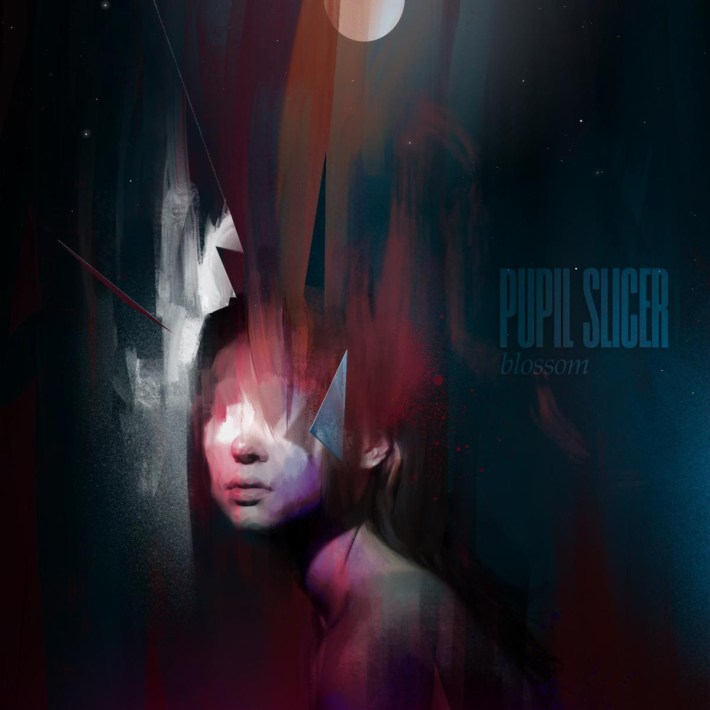Pupil Slicer's Mirrors was one of 2021's finest (and most chaotic) metal albums. The London trio's debut leapt from idea to idea with casual abandon, sweeping up frenzied mathcore, menacing grind, swelling emotive hardcore, bludgeoning death metal, and twinkling post-metal in its wake. The album housed both the bloodcurdling 47-second paroxysm "Stabbing Spiders" and the shoegazing epic "Collective Unconscious," and the band sounded equally convincing operating in both modes. The follow-up to Mirrors, the sci-fi concept album Blossom, may seem at first blush like a more accessible point of entry into Slice World. The band members themselves reject this premise.
"I wouldn't say it's less chaotic," says Pupil Slicer's guitarist, keyboardist, and lead singer Kate Davies. "I would say there's a lot more areas that are less chaotic, but then we tried to turn it up in the areas that are."
"I think perhaps the production lured you into a false sense of security," adds bassist Luke Fabian.
The lush production, helmed by Lewis Johns (Svalbard, Rolo Tomassi), is indeed a step up in fidelity over the rawer, noisier Mirrors. But the band has also dialed in their approach as writers and performers. Where Mirrors was thrillingly all over the place, Blossom follows a more coherent arc, even when it takes wild detours into skittering breakcore or Radioheadish art rock. That arc starts with the album's Badalamentian synth intro, "Glaring Dark Of Night." It's just a minute and change, a simple ascending progression that terminates in the first proper song, "Momentary Actuality." (The two tracks are combined into one video today, serving as Blossom’s final pre-release single). Despite its brevity – and at the risk of reading too much into what's ultimately a tone-setting instrumental intro – the track is a crucial illustration of Pupil Slicer's evolution to this point, as well as a musical and narrative linchpin for Blossom.
"What I envision with that song is what's on the back of the album, which is a heart at night in the middle of the wilderness, and stars twinkling above, and then this signal hits the protagonist and then everything kicks off from there," Davies says. "So, I tried to sort of incorporate it narratively, but then also it establishes some musical ideas for the album, with the types of synthesizers we're using. The progression from that intro track also pops up in like four different songs on the album. Little things like that, just a taste of the sort of stuff that's coming later on."
The establishment of a running leitmotif is a bold pivot from a musician who, by their own admission, didn't originally want Pupil Slicer to have any repeating parts. "One piece of feedback we did bring on board was, 'It would be good if I heard that riff more than once,'" Davies says. "So, I was like, 'OK, you can have a chorus.' But I didn't want to put choruses on the first album, because I didn't know which riffs were the good riffs, or what if they don't like this riff? Whereas on this one it was a bit more conscious to be like, 'I'll play this riff twice, I think it's alright.'"
Davies chalks up their new compositional approach to confidence, and that self-assurance shines through all over Blossom. The album's first chorus, on "Momentary Actuality," is a booming, infectious hook, precisely the kind of part that Davies would have shied away from including in the past. Their clean singing voice, only sparingly deployed and buried in the mix on Mirrors, heralds the arrival of a new Pupil Slicer: "You wouldn't know the pain I faced when I had to go and leave it all behind/ You wouldn't know the agony as I walked away/ It's hard to say." Even the harsh vocals on Blossom, while appropriately "gross and distorted" per Davies, are mostly legible without a lyrics sheet. More than any other element of the album, it's Davies' vocals that make Blossom feel like a leveling up.
"It does, in a way, feel more vulnerable," Davies allows. "When you're just writing harsh stuff, it's like, well, it doesn't matter if this is a contrived or cliched or not very interesting line, because no one's gonna be able to tell what I say. And if it is cleaner and with better diction on the harsh vocals, I have to properly think about every word. Not that I wasn't thinking about it, but there was a lot of stuff on Mirrors which was just sort of written very quickly because we needed to play the song at a gig in three days. So, I was like, 'I'll write some vocals for that.' Whereas this album was a lot more, 'OK, I'm going to sit down and spend a lot of time working on these songs, and throwing out lyric ideas, and being like, 'This isn't working,' start again. A lot more time went into the craft of the lyrics on this one."
All that effort was in service of a knotty, enigmatic story about an alien signal that reaches Earth and subsequently upends an unnamed protagonist's life. The specific details are deliberately impressionistic and fragmented; when I asked Davies for a little help with a plot summary, they resolutely deadpanned, "No."
"I think the fun of it is what people are going to interpret out of it," Davies elaborates. "And I've tried to write it in a way that there's enough room for interpretation, that I want someone else to take away from the story something slightly different than I did. Yoko Taro is a director who directs video games. He writes stuff that's open to interpretation, and all the parts are there, you just sort of have to sit with it and get an idea. And I think that's a lot more fun because if you don't have the beat-by-beat, second-by-second thing of what's going on in the story, your brain's going to do a lot more, and be like, 'Oh, what did this mean?'"
"I was pushing Kate to make it more literal, because in my mind, I was like, I know what happens in [Rush's] 2112 because it's in the liner notes, and it lists it out song by song," Fabian says. "And I know what happens in [Dream Theater's] Scenes From A Memory because it's in the liner notes and it's got all these cues and stuff so you can hear what's happening. And me and Kate had quite a back and forth on that, but we erred on the side of making it more ambiguous. But that being said, 2112 still rules, obviously."
Davies and Fabian agree that Blossom is more 2001 than 2112. "It's more of a vibe," Davies says, by way of evading an explanation. Besides Kubrick's movie and Taro's games, they also cite inspiration from an extensive library of titles including Final Fantasy XIV: Endwalker, Outer Worlds: Echoes Of The Eye, Event Horizon, Sunshine, Jacob's Ladder, I Have No Mouth And I Must Scream, Silent Hill, Dead Space, House Of Leaves, The Metamorphosis, and Bloodborne. The free mingling of video games, literary classics, and sci-fi flicks in that list echoes the anything-goes spirit of Pupil Slicer's music. The band's willingness to challenge themselves is one thing that hasn't changed between Mirrors and Blossom.
"I think all of us have said at some point, 'I can't believe I've written this. Why did I write this?' That's a pretty universal Slicer experience," Davies says. ("That's what I say at every practice," Fabian confirms.) A good part of the band's writing process involves one member adding increasingly bonkers parts to see if their bandmates call them on it. More often than not, the insane idea stays. The Blossom song that best illustrates their method is "No Temple." Davies, Fabian, and drummer Josh Andrews all had a "No Temple" story to tell.
"In the really fast part with all the synths, there's a really distorted bell sound that's going ding-dong-digga-digga-ding-dong-dong, over the whole thing. And it's so horrible and noisy. And [producer] Lewis was like, 'That can't be over that whole section. Just no.' So, it's over the second half of the section and quite low in the mix, compared to where I had it originally, where it was like the main element of the riff. I was like, 'Fuck all the guitars and the drums, just give me that funny synth noise.'"
"I was just like, 'Hmm, what about if I put a Jaco Pastorius-vibe lead at the end of this, but just make it really chromatic and horrible,' Fabian adds. "And here we are. Got it in."
"I was really struggling with ['No Temple'] on the drums," Andrews admits. "I was like, 'Kate, this is really annoying me, can we change it?' And [Kate] said, 'You've sent me the recording of you playing this. What's happened between then and now?' And I was like, 'Oh, did I?' [laughs] So sometimes, you confuse yourself, almost, with what you can do."
So, is Blossom any less chaotic than Mirrors? Perhaps chaos is in the ear of the beholder. No matter what kooky ideas or alien sounds end up making the cut, rest assured: They're only there to serve the ever-growing vision of Pupil Slicer.
"I think it's just a case of crafting the music we really want and not setting limits on ourselves," Davies says. "It's not like we've gone out of our way to write differently to what we were doing on the first album. It's just there's more room to feel confident in ideas and to spend time developing them. If we write it as a band together, as Pupil Slicer, then it's up to us to be like, 'Is this fitting what we're going for on this album?' If so, OK, then we can find a way to make it all work together."
Blossom is out 6/2 on Prosthetic.
We rely on reader subscriptions to deliver articles like the one you're reading. Become a member and help support independent media!







